[Read part 1, “Farewell to a Garden,” here]
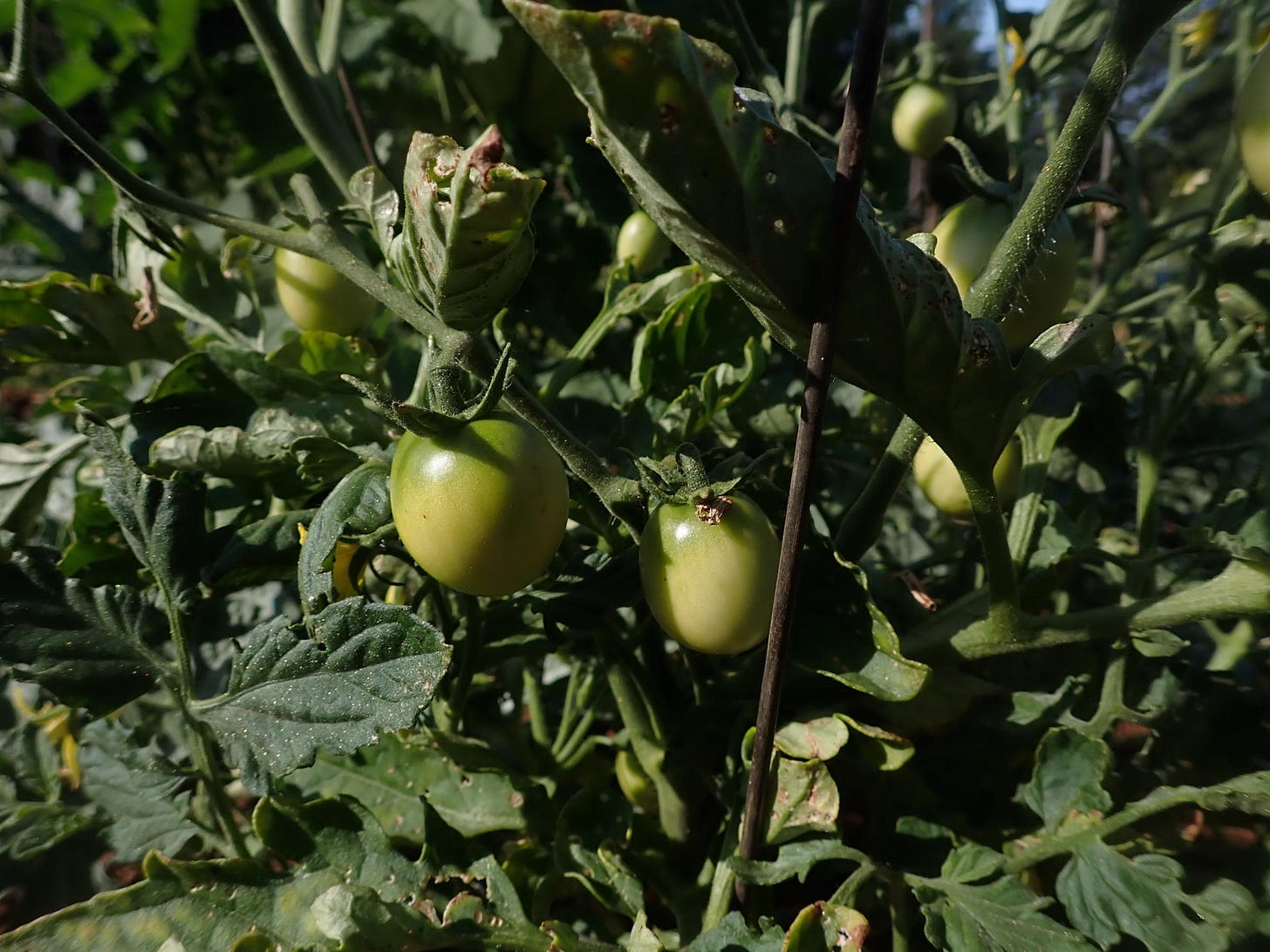
Agriculture as currently practiced in the United States is, by and large, quite harmful to both the environment and to human health. Yes, there are a handful of people who are trying to be respectful of the greater-than-human world and beneficial to their fellow Homo sapiens, but they are the exception, not the rule. Unfortunately, much of what is labeled "organic" is part of the problem, with the industry's mechanized practices, utilization of plastic, depleting of soils, killing of wildlife, profligate use of water, and labor abuses, among other issues. As I've mentioned before, the single greatest threat to biodiversity worldwide is habitat destruction, and its single biggest driver is agriculture. Further, toxins routinely applied in agriculture have deleterious effects on local and far-flung ecologies and on workers and consumers alike. Agricultural labor is some of the most dangerous in the United States (ranking far ahead of policing; maybe we need one of those black and white American flags with a green stripe in it to show solidarity for those suffering far more than the members of the "thin blue line" for their service to the populace).
All this is without even getting into how agriculture changed human cultures for the worse. We broke our ties of reciprocity with our home ecologies, and became dominators, leading us directly to the multiple environmental crises we are facing today. As well, agricultural society spawned patriarchy, slavery, private property, debt and elevated war to new levels of violence.
In sum, it's a big mess.
So, in terms of environmental and social collapse, if we are to have a livable planet and healthy societies, one of our central efforts must be to radically change agriculture. For some starting points, see my "Six Things We Must Do So That Farming Is No Longer Massive Ecocide," in which I spell out that agriculture must be de-monetized, de-corporatized, de-mechanized, re-localized, re-seasonalized, and re-naturalized.
People may be surprised to hear me say this, but, in service of these goals, farmers markets and the market farming that support them are not, in my opinion, all that helpful. Yes, they are local and seasonal by definition. However, many if not most are mechanized, few are naturalized, and all of them are dependent on monetization, which leads to corporatization for the larger operations. Farmers markets are all about income generation, which means bowing to market pressures that are driven by customer expectations, or at least the market farmer's perception thereof. Which can end up resulting in a heavy focus on crops that are resource-intensive to grow or serve only a minor role in providing calories. Think heirloom tomatoes and fancy salad greens.
There's nothing wrong with heirloom tomatoes. Yes, they're juicy and scrumptious and there's nothing else like them. And they only taste that good in the summer. If you're a true tomato fan, you won't eat them outside their brief, 3-4 month window, and you''' eschew the pale, mealy simulacra available in the store in January as inedible. Back in the day, one of my favorite summer meals was a BLT. Nowadays, I swap the bacon for tempeh. And yes, you can preserve tomatoes or tomato sauce in jars, or sun-dry them for winter use, but fundamentally tomatoes are a condiment crop. Is your home-canned tomato sauce delicious on pasta or pizza in the cold months? Sure. But the wheat in the crust or the noodles is what's really feeding you, or the bread in that sandwich, not the tomato. A truly re-localized agricultural system must include grains and other staple crops.
Growing tomatoes requires a lot of work. In northern climes, they must be started indoors in February in plastic pots on heat mats under artificial light, potted up at least twice as they grow, and later moved out to a hoophouse. Then they must be "hardened off" to less pampered conditions (cooler temps, the wind) by hauling them outside in the day and bringing them back in at night. When placed in garden beds, they need soil amendments and eventually trellising, be that cages or wires or something else. Plastic netting might be necessary to prevent predation by birds (though foxes might still get in), or shade cloth to prevent burnt skin on the fruits. From beginning to end, the farmer relies on industrially-manufactured products with short lifespans that end up in landfills or littering the farm and surrounding ecosystems. Regarding water use, tomatoes are not as thirsty as many other vegetables, but again, they are a condiment, and if water availability is restricted for any reason (seasonal factors, climate chaos), then there's that much less for more calorically substantial crops like potatoes, squash or beans: things that can actually *feed* us. What all this means is that in many parts of the US, tomatoes need to be re-envisioned as a "treat" rather than the main attraction.
I tried market farming when I first started urban farming in Portland, Oregon, in the early 2000s. (I was doing everything by bicycle, and my market table was a board placed on top of my boxy bike cart. Surprisingly few people noticed this innovation, to my disappointment, as my car-free methodology was central to my "brand.") On the first hot sunny day in June, people started asking where the tomatoes were. In Oregon, you're lucky to get any before August. So this was an occasion when a farmers market gave an opportunity to educate consumers about what's available when, and that's helpful. But it wasn't the venue for calling into question the cultural priority placed on tomatoes. Teaching people was a sideline. Making money was the main goal. So I was thrilled one season when a cherry tomato volunteered in one of my compost piles in June of 2009 and it actually provided fruit--delicious fruit!--by summer's end. I saved the seeds and have kept the variety going since then (which I named "Zeus," in honor of the cat who lived on the property). In someplace like Oregon, people need to learn to love cherry tomatoes and not put so much emphasis on the big huge beefsteak varieties. #sorrynotsorry
Raising fancy salad greens is impractical for similar reasons. In the heat of summer, many greens that thrive in spring or fall needs lots of water or shade cloth or both, when there are other plants more suited to the heat that could provide fresh greens instead, like Chard, Lambsquarters, Amaranth, and perhaps some varieties of Mustard. Heat-loving Sweet Potatoes are grown for their foliage in Asia and we'd do well for ourselves to introduce such lesser-known options into our diet. A shift like that would require customer education: "Sorry, lettuce and spinach are out of season until September." Plus, this change in strategy would be best accomplished if the majority of the farmers in an area agreed to do it, and that's a big ask, a really big ask among a group of people who are competing with each other. Otherwise, customers will just go to the stalls still offering unsustainable products, and the risk-takers will end up taking home a pile of extras to compost or feed to their animals, and less money in their pocket to show for it. Capitalism discourages cooperation.
Market farmers also face other expectation-driven factors like appearance: most only bring produce that isn't "shaped funny" or doesn't have any holes in it, or is otherwise unblemished, even if these characteristics are superficial. This leads not only to waste but to the further propping up of unrealistic expectations that we honestly can't afford to encourage anymore.
The bottom line is that, in order to create truly local, regionally-based agricultural systems, customer expectations *must* change, and market farmers face too many financial concerns to invest themselves that way, even if they care about the vital mission of creating new systems, which most honestly don't because they're just regular, mainstream people like everyone else with no interest in interrogating the status quo. Yeah, any market farmer is free to limit their offerings to produce that is the least resource-intensive and most nutrient-dense in their region, but they'll probably be giving up income to do so.
So we're in a quandary. Risk-taking is not rewarded in the current farmers market scene, but innovation is absolutely required for us to make the collective changes necessary to have a livable future. More about what I believe we must do to address all this in part 3.
Why, then, did I accept the invitation to work on a market farm in Sonoma County this summer?
First, because one of my best friends in the world lives there as a resident and she invited me to come help, which would mean getting to hang out with her. She explained that, of the two farmers on the land who collaborate on the market farming--one the land-owner and the other a tenant--the tenant had been diagnosed with stage 4 cancer last year so she knew they would need help this season. Secondly, part of the reason I developed farming skills was so that I would have something to offer other than money for living in a place; to do work/trade instead of paying rent. I'm happy to say that at this point in my life, I have enough knowledge and experience and the good judgment that goes with them to legitimately have a lot of offer on my side of the equation. This isn't a brag, just an honest assessment, because I am also aware of my limitations, like all the farmy stuff I don't know. Third, any farming experience is further schooling for me, practically, philosophically and personally, even if it's experience that sours me further on farming. After all, we're dependent on farming in the short-term, even if the ultimate solution is to move away from it and free ourselves and the planet of its stifling domestication.
When my friend made the offer to me, I immediately named my most important condition: that I have some space where I could plant crops for my own personal use, and that such space would be shielded from the pressures of market. I know all too well, from witnessing it at many farms, how intense and even desperate the pressure can be on harvest day, when the goal is to pick anything and everything that can be monetized. I wanted to ensure that I could count on having my own greens, summer squash, beans, carrots, etc., no matter what, not subject to the almighty profit motive. She conferred with the owner and this condition was granted. This arrangement was made clear to everyone on the farm--including the tenant farmer--on multiple occasions, both before and after I arrived.
Still, I want into the season there with caution and some trepidation. My gut told me to watch out. Before going to the farm, I was house sitting at a cabin in a remote section of Humboldt County and I was really enjoying myself there; the rural quiet and the wilderness close at hand made for an excellent writing atmosphere and I was making good headway on my sections of the book I'm co-authoring with Nikki Hill, tentatively entitled, "Don't Blame the Messenger: A critique of the 'invasive plant' narrative." I wasn't in a hurry to go someplace else where my quality of life might be less favorable. So when the landowner of the Humboldt property kept putting off his return, I was totally fine with that, and used it as excuse to delay going to Sonoma County, even though I wasn't required to wait around for him. As it turns out, my gut was right. Another lesson learned, or rather, re-learned for the umpteenth time, lol.
The trouble started right away, and I'll spare most of the details here, but long story short, the owner is sweet elderly gay man who is very popular in the community for good reason, but the tenant farmer is an arrogant, lying, manipulative alcoholic who is disliked or worse in much of the community for good reason. I helped the tenant on a few of his projects but that petered out as it became clear I could not work with him, especially after 11 am, when he hit the bottle most days. He had two modes: 1) Bossy and rude, and 2) casual as if he hadn't just been bossy and rude. After a little while of this game, I realized I had no way of interacting with either mode, so I just stopped speaking to him entirely except when necessary for farm logistics. I also saw that, except for fancy salad greens, he was a bad farmer, so I had nothing to learn from him. Because he was so unpleasant and I didn't want any abuse, I avoided him whenever possible, but that's a miserable situation to be in on a small piece of land.
Most of my energy and time went into working on the owner's section, at least 2/3 of which had been untended for years. I cleared the area, made new beds, and planted most of them up. I removed trash that had been taking up valuable space for literally decades. Neighbors who came by were astounded at the transformation. I counted up the hours at one point and calculated that, if I were being paid a living wage, the monetary equivalent of my work/trade equaled or exceeded market rent in the area. So the owner got a good deal out of it, and I got to do labor that I not only enjoyed but got me into shape. Over the nearly three months there, I moved my belt two notches tighter and built some muscle mass, which feels good. (A recent Grindr date guessed my age as 15 years younger than I actually am, and he saw enough of me to make a good assessment, so that's cool! #toomuchinformation?)
As illustrated with photos in part 1, I planted up beds for myself with some of my favorites. The condition that these beds were off-limits to market was respected.
Until it wasn't.
One harvest day I wasn't present because I was doing roadside weed-whacking for fire prevention for the local home owner's association. (The farm is located on one of 64 parcels in an HOA and the roads are privately maintained by that entity. This was a paid gig.) Greens were needed for a customer, but the market farm was out except for Chard. The tenant farmer picked from my Mustard patch rather than tell the customer "Sorry, nothing this week," which I had observed the owner doing with a customer on a previous occasion.
Besides being a violation of our agreement, which was bad enough, this was particularly poor timing. A couple weeks previously, my Mustards had all started to bolt (go to flower) which meant that they were no longer producing new, tender, full-sized leaves, but only small ones along the flowering stalk that, while still edible, tend to be stringier and not as palatable. In other words, what the tenant farmer took was among the last of my good quality harvest, denying that food and pleasure to me. Plus, as I mentioned in part 1 of this series, these greens were providing sustenance to my heart as well as my stomach because of my relationship to the varieties and their histories. What was stolen from me--and it was theft indeed--was irreplaceable, priceless. Not something I could buy in any store. I was enraged.
Because these greens were so precious to me, I had been harvesting with great attention and care, leaf by leaf, with the goal of maximizing my harvest and wasting as little as possible, and something looked "off" to me when I visited the patch after that harvest day. But it didn't occur to me that someone else had raided them because that was off-the-table, so I was a bit confused. Though that confusion was naive, as I soon came to understand. Almost a week later, the owner confessed to me what the tenant farmer had done and the tenant farmer admitted it when I asked him. He insisted it was within his rights to take what he wanted because he believed I owed him for favors he claimed he had done for me. In other words, he didn't feel like he needed to respect the terms of the agreement I had made with the farm. When I brought this outlook back to the owner, the owner just said, "He's stubborn."
Not "I'm sorry that happened and what can I offer to make it up for you?"
Not "I'll talk to him and make sure it never happens again."
Just, ''He's stubborn."
I told the owner that I hoped he would talk to the tenant farmer, but the gig was up at that point. It had just been clearly demonstrated to me that I could not trust that an agreement made with these people would be respected, and that was a deal-breaker for me. Over the next few days, I finished up the paid weed-whacking gig, instructed my friend on how to care for everything (including my beds, which were now hers as per the owner, and still off-limits for market), and packed up my stuff. I dug my potato crop (not pictured because somehow I didn't take any) even though it was at least six weeks too early to do so, because something was better than nothing. That harvest was about 1/3 full-size taters, and 2/3 babies. Disappointing.
Neighbors and the others residents of the farm were very sorry to see me go (except the tenant farmer obviously) but they all understood. One person said, "But you can't let him win," and I understand that sentiment; however, in my estimation the only way for me to "win" was to be true to myself and not sell myself short. In younger days, I would've stayed and become more miserable, but such experiences have taught me not to make that mistake.
The situation had gone from tentative enjoyment to serious misery in just under three months, but when I made the decision to go, my mood began to lift immediately. Enjoying a beer by a creek at a campsite in the Coast Range the evening of the day I left, I listened to the sounds of the water and the birds, and felt relief wash over me like a cool breeze on a hot day.
I slept well under the stars that night, in a sleeping bag on a pad on the ground, no tent.
When I left the next morning, I experienced a good omen. A black cat!
As an important step in recovering from the trauma of the farm experience, I set up camp by a lake in the Sierra Nevada mountains with Nikki Hill to decompress with her and to write this up for you, dear readers.
I have more big pictures reflections to share too, and those are coming in part 3.





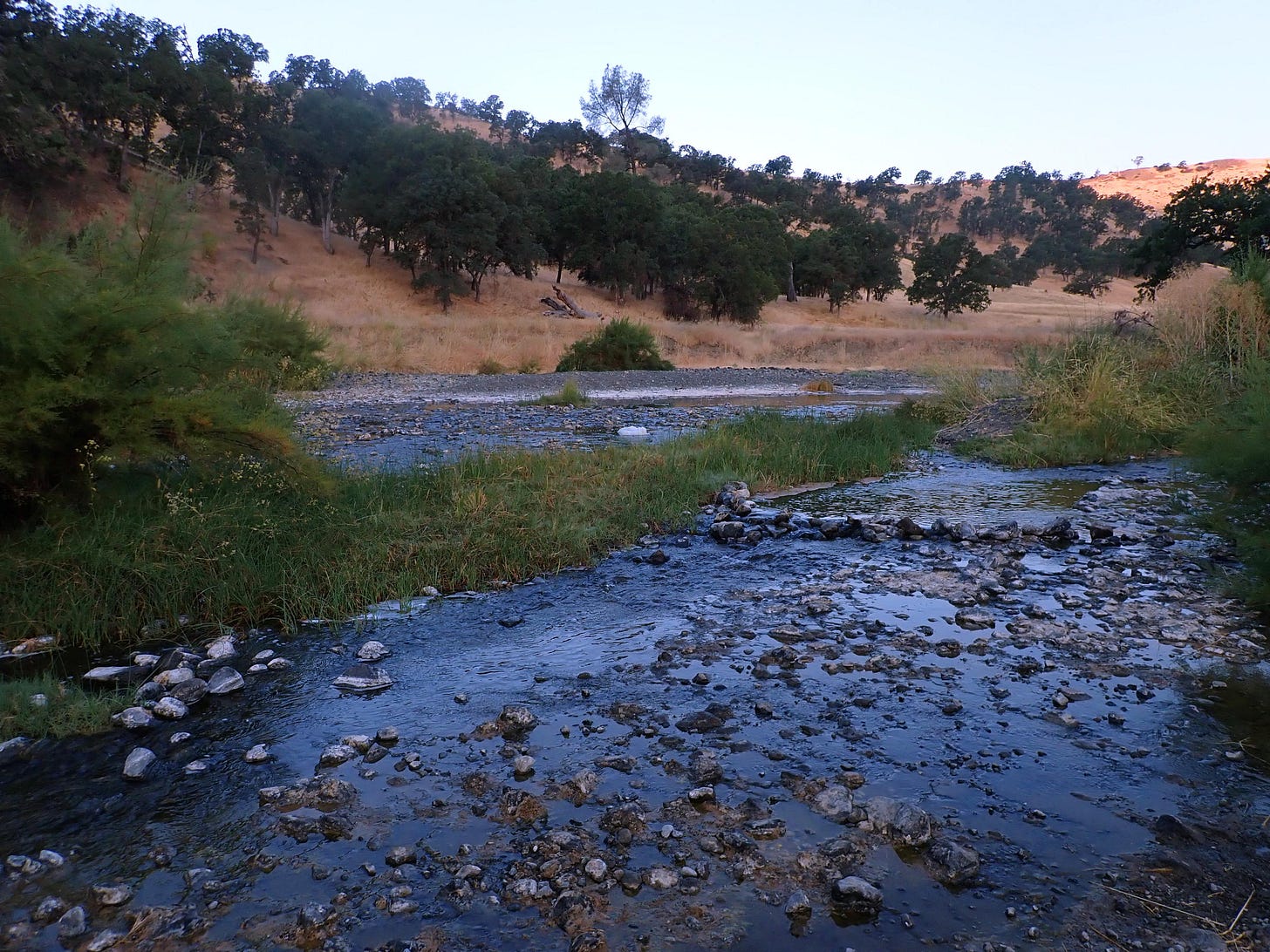
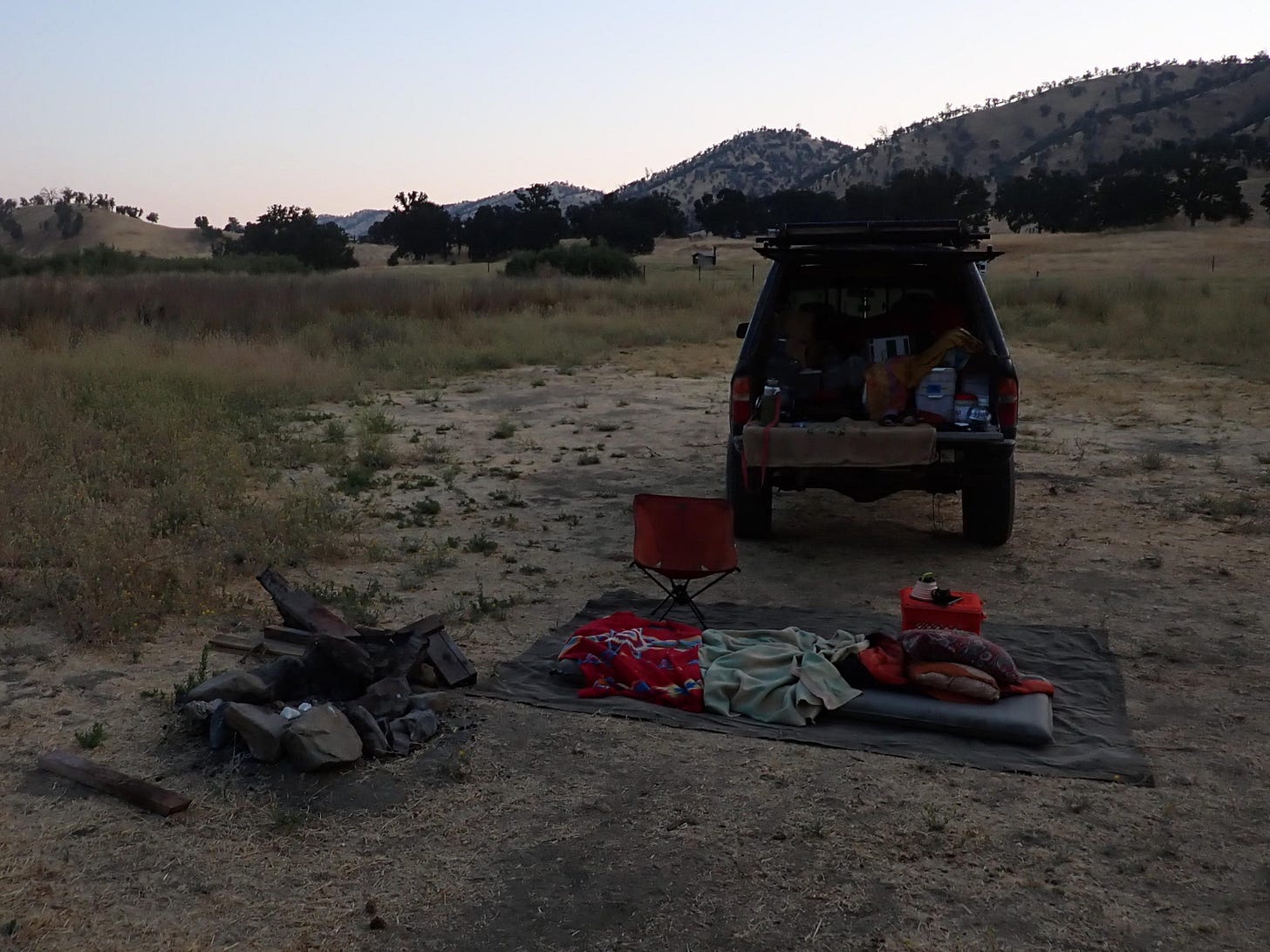
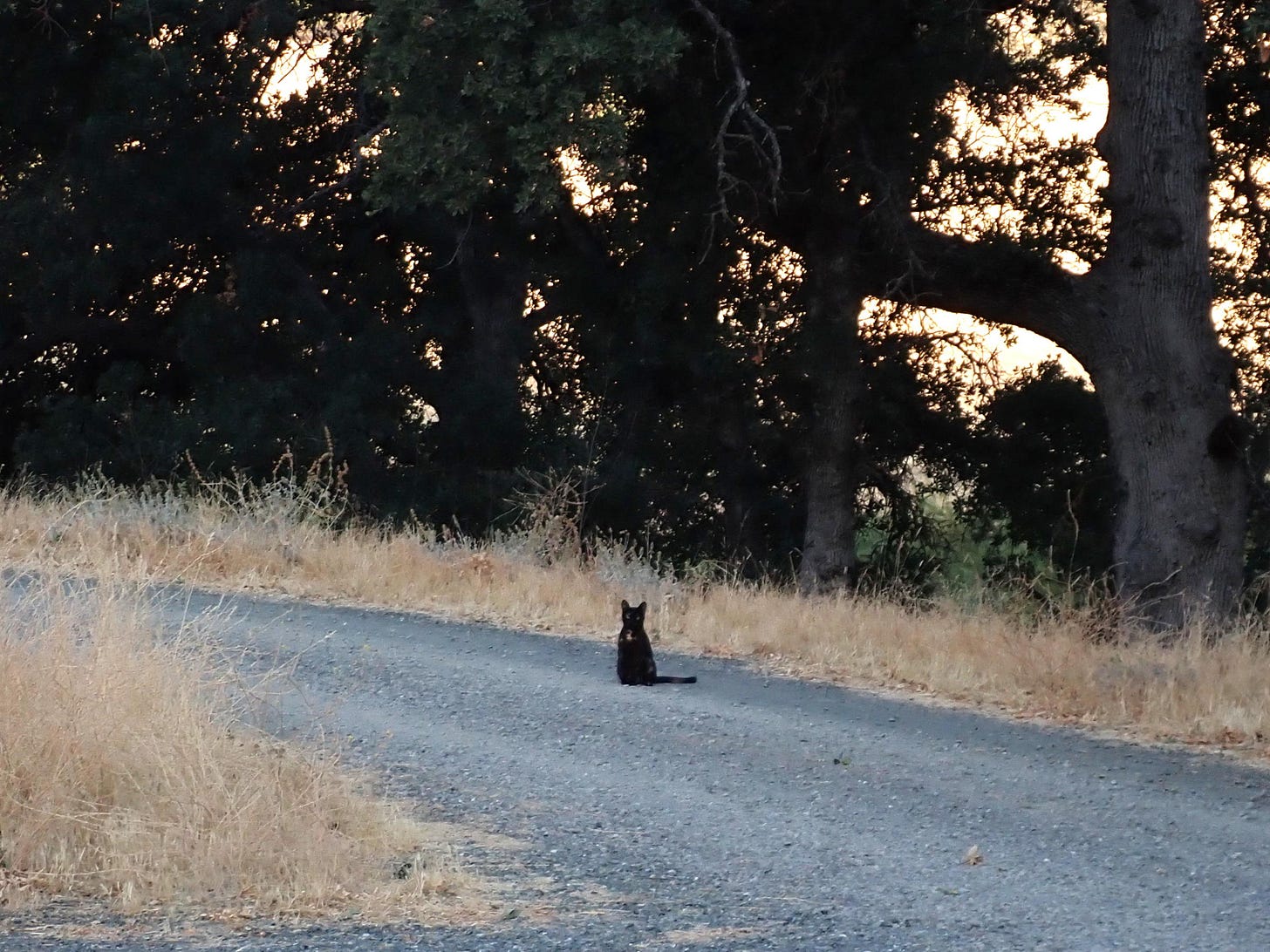
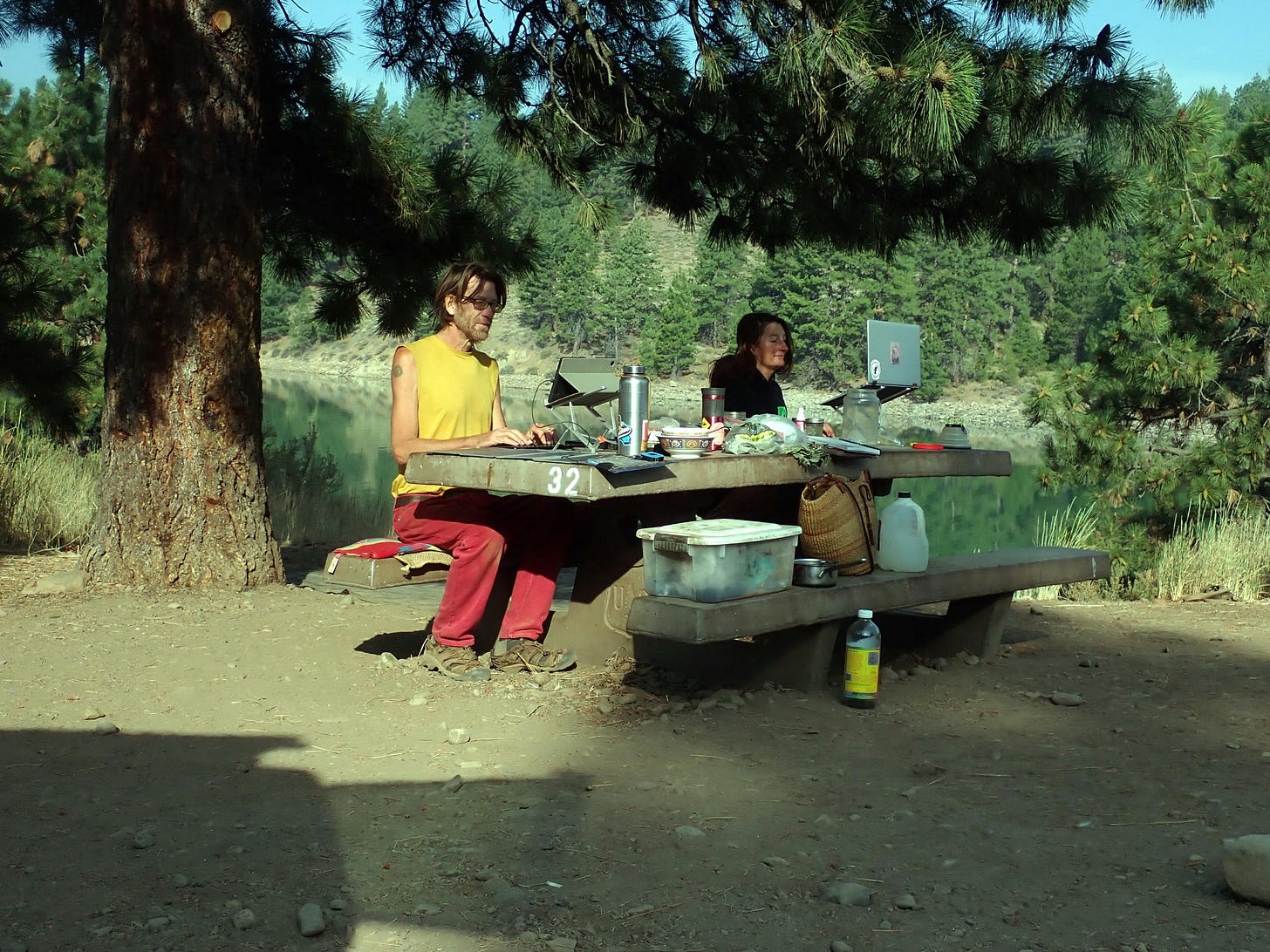
Keep posting Kollibri about who you are and what you are interested in doing and being. You know to keep an ear and eye open for false leads which is to your advantage while seeking new ground for your next garden. Keep envisioning what you want. Substack is a great place to talk about it. Many, many people here who can appreciate your views, as I do.
Whooshing over a wave of respect, power, resilience and thanks for your work and words. Hope you get some rest, insight about what your next steps will be - and a few sweet Grndr guys to help heal through the moment!